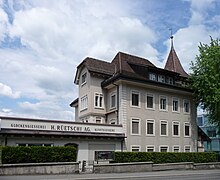H. Rüetschi



H. Rüetschi is one of the last and oldest bell foundries in Switzerland. It is located in the city of Aarau, which is why it is also called the "bell city"[1] is mentioned. Aarau bells can be found in many church towers in Switzerland.
History
Bells have been cast in Aarau since 1367. In the beginning, the foundry was run by a Reber family. Various other genders followed later. In 1607, Hans-Jakob Stalder had a smelting works built on the “Rain”, where the foundry still stands today. At the beginning of the 19th century, Johann-Heinrich Bär sold the foundry to his two employees Sebastian Rüetschi and Jakob Rüetschi (1838–1748). In 1824 they acquired the property on the “Rain” with all accessories for 18,000 Swiss francs.[2]
After Jakob Rüetschi's death, his son Emanuel Rüetschi took over the property and expanded it. He continued to run the company together with his brothers Daniel and Johann Jakob Rüetschi. Hermann Rüetschi, the only son of Johann Jakob Rüetschi, joined the company in 1876 after studying engineering in Lausanne and Munich; he acquired it in 1882. Since he remained childless, the “Rüetschi dynasty” died out with him in 1917.[3] In order to preserve the name, the company was converted into a Swiss public limited company after the First World War.
With the introduction of Krupp steel guns, the last cannonballs were delivered in 1873. Friedrich Wilhelm Schilling, of the German bell-founding family of Apolda, expanded his knowledge here.
Business areas
In addition to casting church bells and other large bells, Rüetschi is also involved in other casting applications:
- Casting of small bells such as house and ship bells, souvenir, decorative, and herd bells
- Casting of works of art, mainly bronze sculptures
- Casting objects for landscape architect.
- Technical casting in Bronze, Brass, Aluminum and special alloys for various industrial and technical applications.
In addition, the company offers know-how relating to the installation of large bells: project planning, vibration isolation in bell towers, acoustics and sound analyses, electrical installation and ringing machines, steel construction for the bell-chair (the hanging system), yokes, clapper and iron fittings. Turret clocks are often associated with church bells. By taking over the Mäder tower clock factory, repairs and maintenance of tower and facade clocks can be offered. In addition, rooms at the Rüetschi bell foundry are also made available to other service companies.



Examples of cast bells
| Location | Year of casting | Beat tone | inscription | Remarks |
|---|---|---|---|---|
| Freiburg (FR), Cathedral of St Nicholas | 1367 | es1 | Giesser Walter Reber[3] | |
| Hilterfingen | 14th century | Fusa sum arow ("cast in Aarau")[3] | ||
| Aarau City Church[4] | 1899 | as0 | "A strong fortress is our God" | 5,275 kg – and seven other bells from 1862, 1899 and 1966 |
| Pauluskirche (Basel) | 1901 | b0 | Be strong in the Lord | 3,575 kg – and four more bells from 1901 |
| Rorschach, Ref. Church | 1904 | f0 | 8,137 kg | |
| Olten, Peace Church | 1928 | as0 | A SOLID FORTRESS IS OUR GOD | 5000 kg – and four more bells from 1928 |
| St. John's Church (Basel) | 1936 | des1 | Sanctus, Holy, Holy, Holy is the Lord God | 2,033 kg – and four more bells from 1936 |
| Gossau SG, St. Andreas | 1958 | f0 | 8,695 kg (largest Rüetschi bell ever cast) – and five additional bells from 1926 | |
| Niedergösgen | 1960 | total0 | 7,020 kg | |
| Expo64 | 1964 | Ut omnes sint unum ("That all may be one") | In the prayer room Zurich Airport | |
| Pfäffikon SZ, St. Meinrad | 1965 | total0 | You are one God with your only begotten Son and the Holy Spirit | 7,040 kg – and five more bells from 1965 |
| City Church of Bremgarten | 1986 | b0 | «ST. NICHOLAS», underneath in smaller letters «BISHOP OF MYRA • A MAN OF KINDNESS • AND HELPFULNESS» | 3013 kg – and five more bells from 1965 |
Web links
References
- ^ new-brand-zur-glockenstadt-ld.1794323 report in the Aargauer Zeitung from October 5, 2013
- ^ O.B. Cappis (2020-09-02). "Jakob Rüetschi (1838–1851)". Argovia.
- ^ a b c "History of the Aarau Bell Foundry". 2018-04-13. Archived from the original on 2017-04-04. Retrieved 2024-04-01. on the company's website
- ^ "Aarau City Church – Bells". Archived from the original on 2015-07-13. Retrieved 2024-04-01.